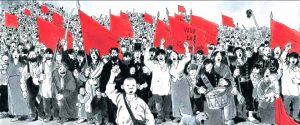Celebrating the Paris Commune of 1871 by Mobilizing Masses for Communism Today
“Are you going to fire on us? On your brothers? On our husbands? On our children?” A Parisian woman defiantly challenged French government troops on the morning of March 18, 1871. The troops came to disarm the masses, and especially to confiscate their cannons.
The masses were not intimidated. They heroically confronted the bosses’ troops and passionately called on them to turn their weapons on their officers, not on the workers. Many troops responded.
Elsewhere in Paris, General Lecomte commanded government troops to cold- bloodedly fire on the workers and charge an unarmed gathering of women and children.
A non-commissioned officer’s voice thundered: “Point your rifles to the ground!” The soldiers did so, rebelling and killing an officer. Later they arrested and executed Lecomte.
Insurrection for workers’ power
The Paris National Guard defeated the troops that refused to join them and ran them out of Paris. It became the first workers’ army, fighting against both the German invaders and the French capitalists.
A month earlier, the Paris National Guard leadership (7200 delegates) had declared that they would fight for the interests of the masses and not be “instruments of despotism.”
By March it had grown to 340,000 troops. Many were unemployed workers who joined for the small stipend and to defend Paris.
After taking control of Paris, the triumphant masses proudly flew the Red Flag of workers’ revolution and founded the Paris Commune.
The Commune lasted only a short time, but this armed workers’ insurrection had a profound impact on the international working class. It showed that workers can take power and organize society to meet their needs—under the harshest conditions.
As the British communist William Morris said in 1886, the Paris Commune aimed for “freedom of labour from the trammels of wage slavery. All its acts were aimed at the extinction of class slavery.”
The Paris Commune inspires us to have confidence in our class. To build a mass ICWP to fight for revolution for communism and nothing less—worldwide.
Revolutionary Parisian masses changed the main contradiction from inter imperialist conflict to class struggle.
The Commune took place during a brutal war between France and Germany, in which the French army was decisively defeated. With Prussian troops besieging Paris, the French bosses abandoned the city, fleeing to their villas to live in luxury.
The masses rose to defend Paris. They mobilized mass meetings in neighborhood committees, councils and the Paris National Guard. They elected a Commune Council of workers from each neighborhood. The National Guard’s Central Committee gave leadership.
During siege, the masses converted town halls into soup kitchens and closed-down theaters into Red Clubs. Later these became forums for daily discussions where workers massively promoted the Commune as an alternative to capitalist power.
They produced and distributed food and medical care, debated military strategy and fought. Women gave leadership to all aspects of the struggle, including the military.
The French and German capitalists were terrified that revolutionary Paris was inspiring wage slaves everywhere. They hurriedly negotiated a peace, freeing 250,000 captured French soldiers to throw against the Commune.
The Commune was the culmination of a revolutionary process with roots in the revolutions of 1789 and 1848. The Communist Manifesto (1848) pointed the way forward. In Paris, members of the first Communist International gave leadership. They advocated arming the masses. And the masses went further: they built the Commune.
The Communards were internationalists. They adopted the red flag, not any capitalists’ flag. They welcomed members from Poland, Russia and Germany to the Commune, which they planned to spread to all of France.
Today we are building one International Communist Workers’ Party to spread communism worldwide to destroy all capitalists, borders and nations.
The Commune pointed to a new way of living.
The Commune declared a moratorium on rent and evictions. They used hotels to house those made homeless by the war. They encouraged workers to take over their workplaces to produce and share what was needed without money.
They freed education from the control of the Catholic Church, which defended the rich and trained workers’ children to be wage slaves. They called for combining work and education and insisted that girls be educated as well as boys.
The key lesson Marx drew from the Commune was that the capitalist state must be smashed. Workers must set up a workers’ state rather than take over a capitalist bureaucracy.
Today ICWP envisions and fights for a communist society led by a mass party with millions of communist doers and thinkers. We invite you to join that party now!
This is the first article in a series commemorating the 150th anniversary of the Paris Commune. Next: Women in the Commune and the Struggle for Communist Workers Power. Following: Political Struggle inside the Commune and Today


